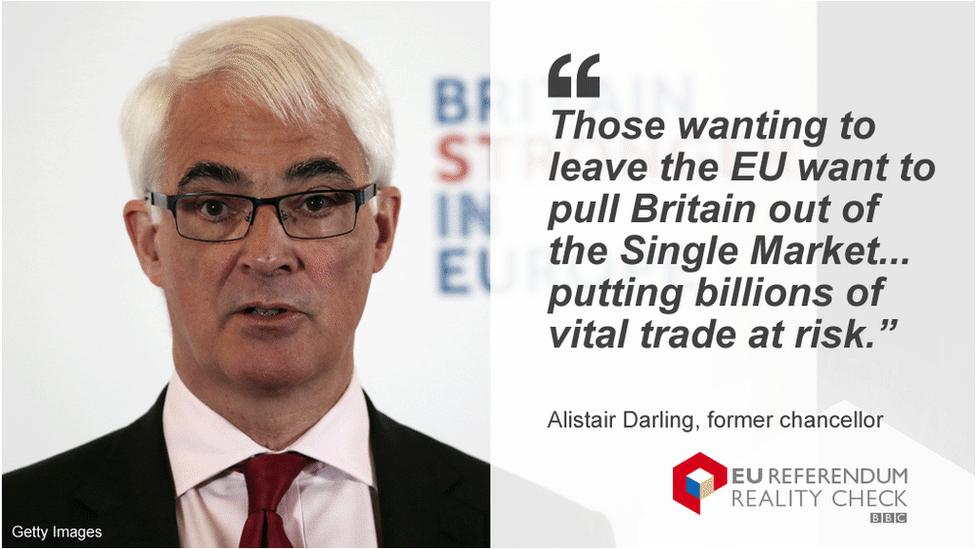Reality Check: Is £250bn of trade at risk from Brexit?
- Published

The claim: Leaving the EU would put £250bn of trade at risk, according to Britain Stronger in Europe.
Reality Check verdict: The group has taken a set of figures predicting the benefits of EU membership and used that to reach a figure for the risks of leaving. It would not necessarily work like that. Also, the figures include imports, a fall in which would not necessarily be a bad thing.
Britain Stronger in Europe (BSIE) says £250bn of trade would be at risk if the UK were to leave the European Union.
In a press release announcing the number, former Chancellor Alistair Darling said: "Those wanting to leave the EU want to pull Britain out of the single market, which would mean introducing tariffs and barriers to our trade and putting billions of vital trade at risk."
The figure is based on part of the Treasury's work on the impact of a Brexit., external
The Treasury compared the amount of trade done between EU members with the amount done by non-members.
That's a tricky thing to do. While the method chosen is reasonable, the conclusions should not be seen as precise.
Its analysis concluded trade with EU countries was 76% higher as a result of Britain being in the EU than it would be if Britain were not.
It also identified smaller benefits coming from membership of the European Economic Area (EEA), and from other free trade agreements negotiated by the EU.
For the EEA it was 44%, and for the other free trade agreements it was 17%.
BSIE has taken those Treasury figures for gains from EU membership, reversed them, and used them to conclude £250bn of trade would be at risk if the UK were to leave the EU.
But looking at how much trade is increased by signing a free trade agreement is not the same as predicting that amount would be at risk from leaving.
The effect of leaving may or may not be the reverse of the effect of joining - there are no examples of countries leaving the EU that could form the basis for the research.
To reach the £250bn figure, BSIE has started with the total amount of trade the UK did with the EU in 2014, which was about £520bn.
Remember, that's a figure for both exports and imports.
But some might think a reduction in imports could be a good thing, helping reduce the country's trade deficit.
If you assume leaving the EU would have the exact reverse effect of joining, then a 76% increase equates to a 43% fall (imagine you were doing £100 of trade - if it increased by 76%, there would be £176 - you would have to reduce it by 43% to get back to £100).
So, you take 43% off EU trade, a loss of £224bn.
Similarly, you take 31% (that's the reverse of the 44%) off the £29bn of EEA trade, a loss of £9bn.
These are the figures BSIE reaches.
Its figure for the trade with countries with which the EU has other free trade agreements, however, looks a bit off.
The Treasury says trade with these countries has been increased by 17% as a result of EU membership.
To reverse a 17% rise, you would need a 14.5% fall.
BSIE says the UK did £62bn of such trade in 2014.
And losing 14.5% of that would be a loss of £9bn, not the £14bn claimed by BSIE.
So, the total comes to £243bn, not the £247bn suggested by BSIE.
But splitting hairs about £4bn or £5bn here and there may be flattering the accuracy of the prediction.



- Published22 February 2016
